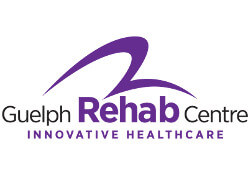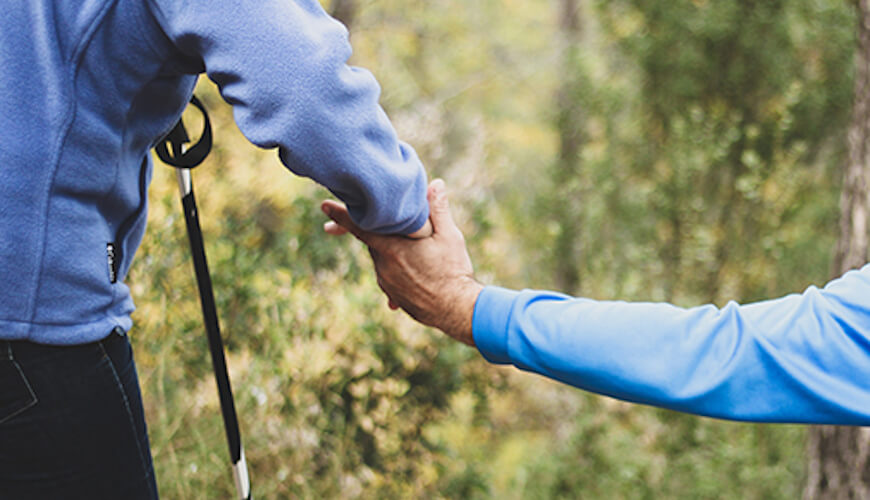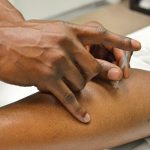Fall has arrived, and we couldn’t be more excited. But while on the topic of fall, we thought this would be a good idea to provide you with some tips for preventing falls. These may not apply to you specifically, but we all have older relatives of some sort in our lives that can benefit from these tips. We encourage you to pass along the tips below to these people whether by word of mouth or by sharing this page’s link by email or on social media.
Continue reading below for a list of some fall prevention tips we think are most helpful for seniors, but also people of all ages. No matter how old we may be, caution can be the difference between enjoying the beautiful weather this time of year and lying on the couch suffering from an injury.
WEAR PROPER FOOTWEAR
As much as we’re all for holding on to the last little bits of summer, it’s time to ditch those trip-hazards we’ve been wearing the last few months. Yes, we’re talking about sandals and flip-flops. With the added risks wet leaves and frequent puddles present, preventing a fall could be as simple as trading in the open-toed footwear for a proper pair of lace-up shoes or boots. These will give you adequate traction on all surfaces and will keep those toes of yours warm. What’s not to like about boot season, right?
CLEAR WALKWAYS
The leaves have already started falling from the trees and so have branches both big and small. And no matter how bare the trees may start to look, these things will continue to fall for a couple more months. This is why it’s essential to be clearing off driveways, sidewalks and walkways on a regular basis. Branches and sticks can become tripping hazards while piles of leaves can disguise hidden obstructions in our pathways that can cause injuries like sprained ankles and more. Even if it’s only once a week, grab a rake or leaf blower and take 15 minutes to clear off any walkways surrounding your home. Not only could it save a family member from suffering an injury, but it will also help keep delivery personnel safe as well.
WINTERIZE CANES, CRUTCHES AND WALKING ASSISTANTS (IF NEEDED)
We hate to say it, but winter is right around the corner. That means before we know it, we’ll be dealing with snow and ice. Take this time to winterize any canes, crutches or walking assistants you or a family member may need when winter arrives. This means installing wider bases on canes and crutches for more ground contact or even installing spikes on the bottom of these things for guaranteed traction. Just remember to remove spikes before using the cane/crutch indoors.
AVOID AVOIDABLE RISKS
This one might sound pretty obvious, but you’d be surprised at how many injuries we treat that could have been avoided. This means, rather than standing on unsteady furniture like a kitchen chair, take the extra moment to grab a sturdy ladder or if in doubt, ask for help. This can be the difference between being injured or healthy.
PLACE EVERYDAY ITEMS WITHIN EASY REACH
Everyone has those items they use every day. Whether it be the coffee mugs, cereal box, toaster, microwave or something else. Whatever it may be, we suggest placing these items in an easy access place— preferably eye level. This will minimize the need to stand on stools, crouch or reach, and will reduce the risk of straining or injuring yourself. And although crouching may seem less risky than standing on a stool, for some people it can cause as much damage to their body. The more you can place at eye level around your home, the better.
DON’T STAND UP TOO FAST
This is a prime example of a tip that applies to people of all ages. Whether you’re in the washroom, at the dining table or on the couch, give yourself time to adjust. This means giving yourself at least 10 seconds when moving from lying down to sitting or sitting to standing before you move away from whatever you were seated on. For extra caution, we recommend holding on to the bathroom counter, dining table or arm of a couch or chair until you have your wits about you to make sure you don’t fall due to dizziness.
As hard as we may try, accidents are bound to happen. But knowing how to treat an injury can be the difference between a long recovery and a quick one. And unless you’re a physiotherapist, doctor, nurse or other healthcare professional, we imagine you probably don’t know where to start when it comes to treating various injuries. If you find yourself in this case, we strongly recommend visiting our Guelph office or another rehabilitation clinic. We have many highly-trained healthcare professionals ready to assist you with everything from a strained back to a twisted ankle. Not only do we have the experience to treat various injuries, but we can also recommend the proper rehabilitation or treatment to ensure you get the attention you need.
If you have any questions regarding anything talked about in this article, an injury you may be suffering from or would like to schedule an appointment to meet with one of our specialists, we encourage you to contact us by phone or email, and we would be more than happy to help.








